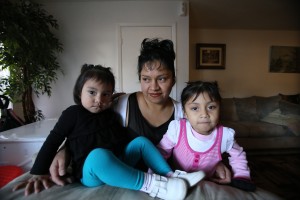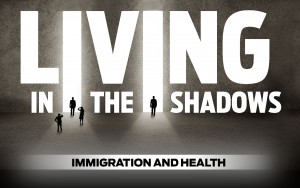
Jennifer Barajas (11) cries when she speaks about her father Ramón Barajas, detained in an immigration hold. Photo: Johanes Roselló/MundoHispánico.
By Johanes Roselló, Reporting on Health Collaborative
At 11 years old, Jennifer Barajas says that she has a broken heart. As soon as she begins to talk about her father, Ramón Salvador Barajas, who is in the process of being deported, the smile disappears from Jennifer’s face.
“The day they caught him, I waited and waited, and I saw that that he wasn’t coming, and I became sad. And now we have been without him six months, and I don’t want to be without him any longer because we all feel alone,” said the Mexican girl.
Since May 28 of 2013, when the police arrested Jennifer’s father at a checkpoint in Forest Park, Georgia, for driving without a license, the lives of Jennifer, her mother, and her younger brother have been turned upside-down.
“The hardest part is not having him here. We were used to the time he would arrive home from work; the children would run to hug him, and me, too,” said Reyna Paniagua, Jennifer’s mother. “I have calm times, but I have times of depression, nights that I can’t sleep. I’m very nervous; I’m going crazy with nerves,” admitted Jennifer’s mother, who also has three other children who cialis are U.S. citizens.
She says that her children can’t sleep well. They wake up screaming at night. Even the oldest has needed the help of a psychologist, referred by the school, where they observed that she was distraught and tearful.
The Barajas’ family’s situation is not unique. In Georgia there are many families that have suffered because of deportations, in most cases, of the head of the family.
Between 2008 and 2013, the office of Immigration and Customs Enforcement (ICE) in Atlanta – which also covers North and South Carolina – deported 114,590 people and had the seventh highest number of expulsions among jurisdictions during those years. Experts say that most of those who were deported have children.
This separation not only leaves the mother and children who are left alone with an emotional burden, but also with the loss of financial support, the risk of losing their home and the lack of resources to meet basic needs.
A Common Diagnosis
“The experience of the deportation of a loved one commonly results in clinical depression,” explained Rocío Woody, founder of The Road to Recovery, a clinic that has offered psychological services to many immigrants since 1995. Woody is an experienced psychotherapist with Peruvian roots whose clients include families affected by deportation.
According to Woody, people who face this experience suffer feelings of hopelessness, powerlessness, rage, frustration, and the loss of freedom and their right to choose.
“I have seen a lot of depression, feelings of pessimism. Another thing that I have seen is a depressed anxiety, in which the person sometimes does not know what to do with herself, where she gets angry very quickly, becomes very irritated, and then the children begin to have an effect on her,” commented psychotherapist Alonso Romero.
Romero, a Colombian with 20 years of experience, sees many immigrants affected by family separation and evaluates them with the purpose of demonstrating extreme and unusual hardship in immigration courts, seeking cancellation of deportation from the judges.
Research carried out all over the country attests to the existence of emotional consequences caused by deportations.
According to the study “Voices: Exploring the Experiences on Non-Mental Health Professionals working with Mexican Immigrants Affected by Deportation,” from New Mexico State University and Marymount University, “suffering, anxiety, pain, fear and trauma” are common feelings of families separated by immigration actions.
For the parents and children who stay in the country without the one who was deported, “the American dream becomes a nightmare,” according to this report.
These effects are also supported by The Urban Institute’s report, “Children in the Aftermath of Immigration Enforcement” in 2010, which explored the experience of more than 100 children affected by family separation in five cities around the country. It found adverse changes in nutrition and sleep patterns, as well as heightened fear, anxiety, anger, and aggression.
According to Woody, she sees an average of two of these cases a day. Yearly, she serves some 480 families under these circumstances, whether their family member was deported or is in the process of being removed from the country.
Immigration lawyers refer many of the cases that the psychotherapist takes, and most of her clients live in Georgia. Mexicans, Hondurans, and Salvadorans are among the most common nationalities that she serves.
Immigration lawyer Carolina Antonini, from the firm Antonini & Cohen Immigration Law Group, has been a witness to the effects on the mental health of the families from deportation.
“In children we see a situation where there are cases of depression, where there had not ever been depression before, cases of anxiety, cases of fear of authority figures. Situations where we have children who start to cry or hide when they see police officers,” said Antonini.
“I have clients who, three minutes after sitting down, start to cry uncontrollably, from the stress the immigration problem causes in their lives,” she commented.
A Heavy Blow to the Children
For the children of deported parents, the experience of family separation creates instability. Jennifer’s school routine, for example, has been interrupted by her deep sadness.
“I start crying because I think that my Papa isn’t with me, and I feel like any minute he could come and be right there in front of me, but when I see the door, and I see that he isn’t there, I get sad,” she said.

Dionila Roblero (center) with her daughters Daisy (4) and Saraí (1). Photo: Miguel Martínez/MundoHispánico.
Dionila Roblero, from Guatemala, lived through this experience a year ago, when her husband was deported after being arrested in Norcross and put into the deportation process for being undocumented.
“If there was one thing in my heart that hurt me every day, it was hearing them telling me, ‘Don’t close the door, my Papi’s coming;’ that was really difficult in the early days,” commented Roblero.
The 32-year-old Guatemalan mother remembers that her young children Erick and Daisy, 5 and 4 years old, respectively, didn’t eat or sleep well, and they became ill.
“Daisy would wake up at midnight screaming, and sometimes she didn’t even want to hear them say Papa,” remembered the mother, who also had a 1-year-old baby. All three of her children are U.S. citizens.
According to Laura Marantz, school counselor at Berkeley Lake Elementary School, every year she serves more children who suffer because of family separations. The educator compares the experience of deportation with the death or divorce of one’s parents.
“The children experience grief in many ways,” Marantz said. “They feel shock…They can feel anxious, depressed.”
In school, it is hard for them to concentrate. They get angry easily and they even become aggressive, which occasionally can cause discipline problems.
Rosalba Peña, who works as an interpreter at Norcross High School, estimates that in the past three years she has seen an increase in the number of children who face this situation. On average, she has served about 40 students per year in these circumstances.
“I have noticed their depression, that they feel completely helpless, they start failing their classes, they start slipping in their attendance,” Peña said.
Peña explained that many times the teachers don’t understand the reasons why the students start failing and think the kids are just not trying.
“When we start to investigate, we realize that in reality, they have lost a dad or a mom because they have been deported for driving without a license,” she maintained.
For teenage children who experience deportation, their role in the family often changes once the father is no longer present or the mother has to leave the home to work.
“They go home to cook for their little brothers and sisters. They feed them; they help them with their homework. It’s like being a father when you’re between 14 and 19 years old,” said Consuelo Rosas, parent liaison at Osborne High School in Marietta.
“It’s difficult for them to have a teenage life, when they have to become adults as soon as they get home,” added Rosas, who said that in her three years working in this school she has served hundreds of children who have gone through the deportation of a parent.
On many occasions, these teens even have to work part time while they study to be able to support their families, said Peña.
Trouble Keeping Family Life in Order
Reyna Paniagua, Jennifer’s mother, says that she has lost more than 15 pounds since the arrest and imprisonment of her husband.
Her fear for what would happen to her family led her to seek medical treatment, and she is currently taking medications for anxiety.
“I am to the point that I can’t do this anymore with this situation. I don’t have the courage to be alone, I feel so nervous, unglued, and I can’t sleep,” said Paniagua between tears.
The Mexican mother says that she needs to seek the help of a psychologist.
“I can’t afford to go,” Paniagua said. “I don’t know where one would be. But yes, I would love for them to help me, and to be able to receive psychological help.”
Her support has been friends and the priest from her church.
For families such as the Barajas family, hope remains alive. Jennifer prayed that on January 6 she would receive a Three Kings Day gift: a hug from her father, who has a scheduled appearance in immigration court that day.

Dionila Roblero, a Guatemalen immigrant, started to cook and sell food, to support her three children since her husband was deported. Photo: Miguel Martínez/MundoHispánico.
For the Robleros, the anguish has become resignation. Dionila has found a way to provide for her family by selling food and caring for children in her home.
Despite the pain, hopelessness, and depression she feels, the love that she feels for her children, her faith in God, and the support of her church help her stay strong.
“Thank God I could put my feet on the ground, and I said ‘I have to be strong for my children. I have to be here for them and I have to be healthy for them.’” Dionila said, with tears in her eyes. “It’s really hard, but here we are.”
This story was possible thanks to The National Health Journalism Fellowship, a program of the USC Annenberg School of Journalism.
 About Living in the Shadows: This project results from the Reporting On Health Collaborative, which involves MundoHispánico in Atlanta, New America Media in California and New York, Radio Bilingüe in Oakland, WESA Pittsburgh (an NPR affiliate), Univision Los Angeles (KMEX 34); Univision Arizona (KTVW 33), and ReportingonHealth.org. The Collaborative is an initiative of The California Endowment Health Journalism Fellowships at the University of Southern California’s Annenberg School for Communication and Journalism.
About Living in the Shadows: This project results from the Reporting On Health Collaborative, which involves MundoHispánico in Atlanta, New America Media in California and New York, Radio Bilingüe in Oakland, WESA Pittsburgh (an NPR affiliate), Univision Los Angeles (KMEX 34); Univision Arizona (KTVW 33), and ReportingonHealth.org. The Collaborative is an initiative of The California Endowment Health Journalism Fellowships at the University of Southern California’s Annenberg School for Communication and Journalism.
We Want to Hear from You! As the Living in the Shadows series unfolds, we welcome your ideas. You are part of the story too and we invite you to share your perspective and experiences by writing to immigranthealth@reportingonhealth.org, calling us at (213) 640-7534 or by joining the conversations on these topics on Facebook at https://www.facebook.com/immigrantshealth or on Twitter at @immighealth.














